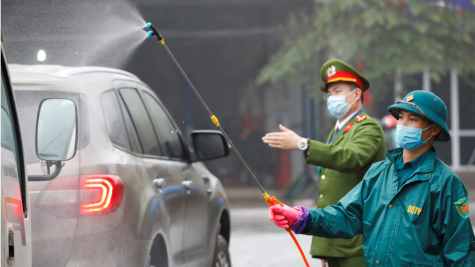How 4 countries are dealing with the COVID-19 pandemic
April 21, 2020
As this worldwide epidemic progresses, each country is implementing its own guidelines and recommendations in an attempt to keep its citizens safe and healthy. Some governments are enforcing curfews and others have obligatory quarantine. Naturally, people want to know what their own government is doing, and what could affect them personally. However, learning about the reactions of countries not often on the news and how this virus has affected them could provide us ideas and techniques for staying safe, as well as understand more about this rapidly changing and volatile situation.
Vietnam:

Vietnam seems to be one of the most prepared countries to handle this pandemic. With only 265 confirmed cases, 165 of which are recovered, and no deaths, Vietnam’s prompt and meticulous response seems to have paid off. Because of Vietnam’s lack of robust public healthcare and limited government funding, the government carried out rigorous tracing and documentation of all confirmed and potential COVID-19 cases, and used the already extensive state security and patrolling military personnel to ensure that all citizens were following quarantine and curfew regulations. Vietnam also had one of the quickest response times, with a three-week quarantine of Hanoi – a town of 10,000 – being ordered as early as mid-February despite there being only 10 confirmed cases nationwide at the time. Currently, the entire country is in a 15-day lockdown to limit the effects of the second wave of infections.
Australia:
As with most countries, Australia’s first confirmed cases appeared in January, and have been steadily rising to reach 6,400 confirmed cases, with 61 deaths. The government’s first response was to simply limit travel and ensure that those arriving in Australia self-isolated. The National cabinet had the first meeting on March 13, where it was decided that gatherings of more than 500 people should be canceled. However, schools, universities, workplaces, public transport, and airports were not included in this recommendation. Over the month of March, these restrictions were expanded to restrict all public gatherings of more than 2 people, and the only four acceptable reasons for Australians to leave their houses were shopping, medical needs, exercise, or for work and education. The government has begun providing billions of dollars of economic support to encourage investment, keep people in jobs, provide medical care, deliver prescription medicine, and support mental health. Recently, on April 13, the Tasmanian government closed the 2 hospitals for cleaning and for cleaning and put the entire staff of over 1000 people and their families into quarantine.
Turkey:
The spread of COVID-19 began much later in Turkey than in other countries, with the first confirmed case being discovered on March 11. Since then the virus has spread throughout the entire country with 61,050 cases and 1,296 deaths. Throughout the months of January and February, the Turkish government enacted large scale preventative measures to stop the potential spread of the virus. Measures such as installing thermal cameras in all airports with flights coming from China, and later imposing travel bans to and from over 68 countries. Mass disinfection work of public areas and transport were carried in February and early March. However, once the first few cases arrived in Turkey, the government was unable to enforce a stringent enough protocol and the virus has spread rapidly since then. On April 10th a 48-hour lockdown was declared, however, it incited the population into panic buying, thus sharply increasing the risk of contagion rather than decreasing it.
Mexico
In Mexico, the government took a much more lax approach during the early days of the pandemic. This allowed the virus to enter the country in early February, and the current statistics confirm about 5400 cases and 406 deaths. The president and Mexican government were criticized heavily for their hesitation to implement large scale public health and safety measures, such as the closing of public areas and financial support for those in need. Currently, the population is recommended to stay at home, and various state officials are pledging to donate their salary for a few months to help support the families unable to earn anything during this time.
